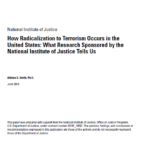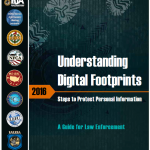
Since its founding in 2012, the National Institute of Justice’s Domestic Radicalization to Terrorism program has sponsored research on how radicalization to terrorism occurs in the United States in order to support prevention and intervention efforts. These projects have taken a variety of approaches to examining the process of radicalization to terrorism, but in spite of this there is substantial overlap in their findings, which collectively provide evidence of the importance of several facilitators of radicalization and the need to take into account how this process unfolds within individuals over time.


